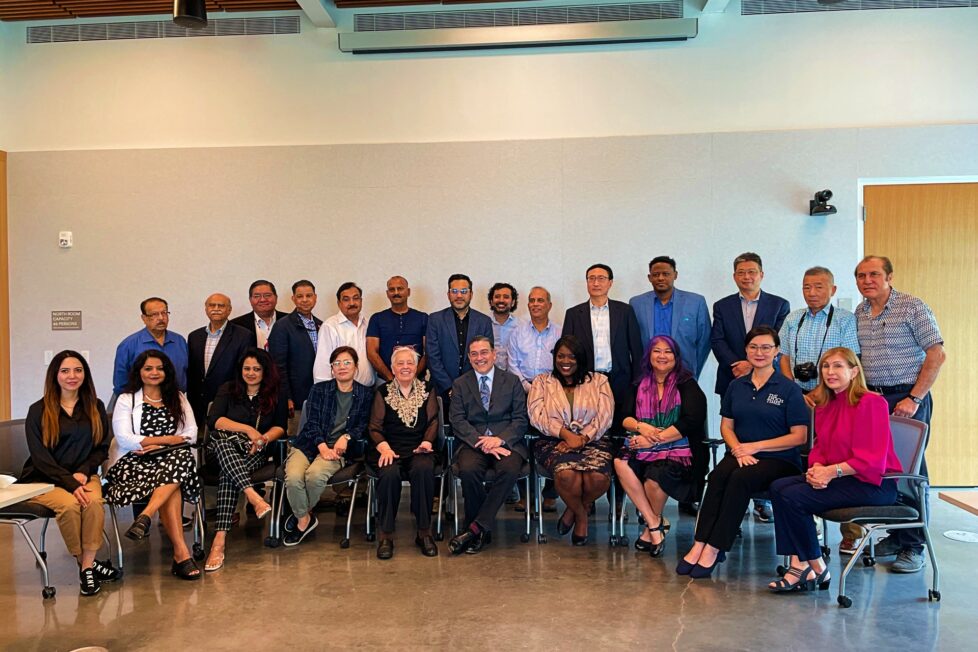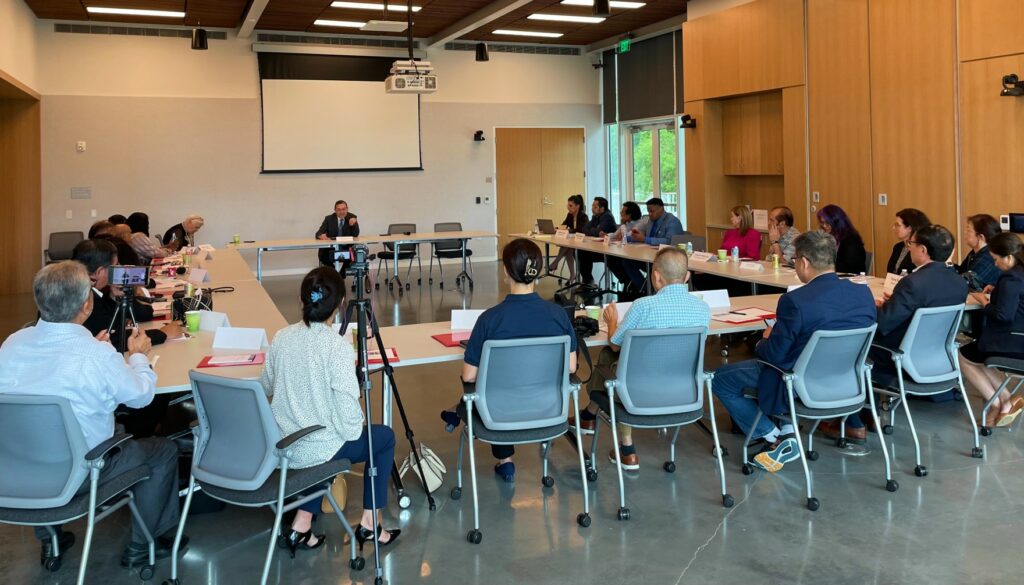Census director stresses importance of being your ‘whole self’ while encouraging Houston’s ethnic media to remain ‘trusted voices’ in community


United States Census Director Robert Santos visited Houston on May 24 to encourage ethnic media to help continue being the “trusted voices” of the community.
This type of partnership between the bureau and local media is crucial to making sure the community understands the importance of the CB and the many valuable resources it brings.
Director Santos shared a personal story – that happened when he was around 5 or 6 years old – on why he is passionate about serving the community in the most “authentic” way.
“During the fall, it would get kind of cool in our little bungalow house, we had seven people in it. It would be a little drafty and I was sound asleep with the covers over me and I was startled because I felt something. Like most homes, we had mice and one had crawled up onto the bed. It was on top of the cover and started running up the side of my body,” he explained.
Santos said he screamed and threw himself out of bed, waking up everyone in the house. For nearly a week he could not sleep peacefully, terrified that the mouse would return. One day, his grandmother had him lie in the bed as she took a branch, had him close his eyes, then whispered a prayer while brushing the leaves across his body.
She told him she gave him a blessing to take away the fear.
“It absolutely worked. From then on, I was no longer afraid of a mouse climbing up,” Santos said. “It occurred to me years later that what she had done, she had used her whole self, all the powers and life experiences and the culture she had within her to address a problem with her loved one.”
Santos said when he got the call from the White House a couple of years ago and they spoke to him about consideration of being nominated for the position, he thought about how he would present himself.
Should he cut his long hair, which he wears in a ponytail? Should he get a buzz cut, possibly deemed more acceptable? He thought about his grandmother.
“I realized that by going through that experience as a little kid that my grandmother had taught me to be my whole self,” he said.
He did not change his appearance or alter who he was and, as clearly shown, he was selected for the position.
“Getting to the Census Bureau and leading the largest federal statistical agency in the country, I saw that I could contribute to the excellence that has always been a part of the Census Bureau by using my life experience and teaching others that their life experience, their culture, their values add something different and new in terms of creativity in the nation,” Santos said. “Having a common problem and getting different perspectives on it, that’s when you get the most insight. That’s when you can identify the real solution, rather than treating a symptom.”
The 2020 Decennial Census, while historic, showed in many instances the “distrust” and “mis- and disinformation” across the nation. Many residents were apprehensive about filling out self-response surveys and a looming “citizen question” created controversy.

The bureau had the tough task of making sure residents were counted in order to ensure they receive resources that would help with overall advancement and equity.
The bureau relied on community leaders from all walks of life – including political, business, spiritual, educational, and responsible media outlets to provide messaging about the necessity of involvement, while letting people know that the bureau is safe, confidential and here to help.
Many wonder. What exactly is the role of the Census Bureau?
Some think it is a basic “head count” of the nation, with “nosey government folks” snooping around in your business.
While that frankness may sound funny to read, it is how many people feel.
It’s quite the opposite. You may be interested to learn that its mission is actually guided by scientific objectivity.
It can be explained, in basic form, as gathering information – to provide education – to further innovation, ultimately enhancing our daily lives. The Census Bureau provides current facts and figures about America’s people, places, and economy, and federal law protects the confidentiality of all information collected.
The census has various statistical programs, but the most widely known is the Decennial, which happens every 10 years. The once-a-decade population and housing count, which is required by the U.S. Constitution, counts all 50 states, the District of Columbia, Puerto Rico, and the Island Areas. The results determine the number of seats for each state in the U.S. House of Representatives and are used to draw congressional and state legislative districts and to distribute hundreds of billions of dollars in federal funds each year.
There’s more.
The Economic Census measures the nation’s economy every five years, providing vital statistics for virtually every industry and geographic area in the country.
The Census of Governments provides comprehensive data about the nearly 90,000 state and local governments in the nation every five years.
The American Community Survey (ACS) is an ongoing annual survey that shows what the U.S. population looks like and how it lives. The ACS helps communities decide where to target services and resources.
COVID-19 added another layer, with the census including surveys to ensure equity among to survey collection.
There are many other surveys and data the census gathers to help make vital decisions across America.
The results of the census help determine how hundreds of billions of dollars in federal funding, including grants and support to states, counties and communities are spent every year for the next decade. It helps communities get its fair share for schools, hospitals, roads, and public works. That funding shapes many different aspects of every community, no matter the size, no matter the location. These funds are based on population totals and breakdowns by sex, age, race and other factors. Your community benefits the most when the census counts everyone.
The results also inform how federal funding is allocated to more than 100 programs, including Medicaid, Head Start, block grant programs for community mental health services, and the Supplemental Nutrition Assistance Program, also known as SNAP.
The media is one of the strongest voices in keeping the communities informed, engaged and in participation.
“If I say, ‘please answer the survey,’ people will shrug it off. If that message comes from you and community-based agencies that people know, that’s a different thing. We have to start the process now, not wait until 2027,” Santos said.
He also added why the Bayou City’s participation is vital.
“Houston is very special to me. My wife is from Houston and I am from San Antonio so I know Houston pretty well,” Santos said. “Houston is an immensely diverse, richly diverse, beautifully diverse city. Houston is a really, really important area from which we can actually learn a lot about how we can do outreach to other communities.”
